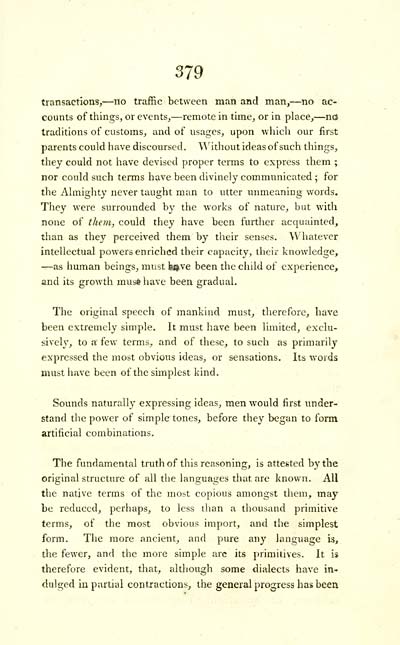Blair Collection > Celtic researches, on the origin, traditions & language, of the ancient Britons
(473)
Download files
Complete book:
Individual page:
Thumbnail gallery: Grid view | List view

379
transactions, — no traffic between man and man, — no ac-
counts of things, or events, — remote in time, or in place, — nd
traditions of customs, and of usages, upon Avhich our first
parents could have discoursed. Without ideas of such things,
they could not have devised proper tenns to express them ;
nor could such terms have been divinely communicated ; for
the Almighty never taught man to utter unmeaning words.
They were surrounded by the works of nature, but with
none of them, could they have been further acquainted,
than as they perceived them by their senses. Whatever
intellectual powers enriched their capacity, their knowledge,
— as human beings, must fe^ve been the child of experience,
and its growth muse have been gradual.
The original speech of mankind must, therefore, have
been extremely simple. It must have been limited, exclu-
sively, to a few terms, and of these, to such as primarily
expressed the most obvious ideas, or sensations. Its words
must have been of the simplest kind.
Sounds naturally expressing ideas, men would first under-
stand the power of simple tones, before they began to form
artificial combinations.
The fundamental truth of this reasoning, is attested by the
original structure of all the languages that are known. All
the native terms of the most copious amongst them, may
be reduced, perhaps, to less than a thousand primitive
terms, of the most obvious import, and the simplest
form. The more ancient, and pure any language is,
the fewer, and the more simple are its primitives. It is
therefore evident, that, although some dialects have in-
dulged in partial contractions, the general progress has been
transactions, — no traffic between man and man, — no ac-
counts of things, or events, — remote in time, or in place, — nd
traditions of customs, and of usages, upon Avhich our first
parents could have discoursed. Without ideas of such things,
they could not have devised proper tenns to express them ;
nor could such terms have been divinely communicated ; for
the Almighty never taught man to utter unmeaning words.
They were surrounded by the works of nature, but with
none of them, could they have been further acquainted,
than as they perceived them by their senses. Whatever
intellectual powers enriched their capacity, their knowledge,
— as human beings, must fe^ve been the child of experience,
and its growth muse have been gradual.
The original speech of mankind must, therefore, have
been extremely simple. It must have been limited, exclu-
sively, to a few terms, and of these, to such as primarily
expressed the most obvious ideas, or sensations. Its words
must have been of the simplest kind.
Sounds naturally expressing ideas, men would first under-
stand the power of simple tones, before they began to form
artificial combinations.
The fundamental truth of this reasoning, is attested by the
original structure of all the languages that are known. All
the native terms of the most copious amongst them, may
be reduced, perhaps, to less than a thousand primitive
terms, of the most obvious import, and the simplest
form. The more ancient, and pure any language is,
the fewer, and the more simple are its primitives. It is
therefore evident, that, although some dialects have in-
dulged in partial contractions, the general progress has been
Set display mode to: Large image | Transcription
Images and transcriptions on this page, including medium image downloads, may be used under the Creative Commons Attribution 4.0 International Licence unless otherwise stated. ![]()
| Early Gaelic Book Collections > Blair Collection > Celtic researches, on the origin, traditions & language, of the ancient Britons > (473) |
|---|
| Permanent URL | https://digital.nls.uk/75769098 |
|---|
| Description | A selection of books from a collection of more than 500 titles, mostly on religious and literary topics. Also includes some material dealing with other Celtic languages and societies. Collection created towards the end of the 19th century by Lady Evelyn Stewart Murray. |
|---|
| Description | Selected items from five 'Special and Named Printed Collections'. Includes books in Gaelic and other Celtic languages, works about the Gaels, their languages, literature, culture and history. |
|---|

